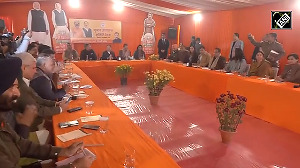Telecom companies with cases pending before the Telecom Dispute Settlement and Appellate Tribunal or those hoping to file new ones would be advised to hurry.
In a little over three weeks, the TDSAT will stop functioning for all practical purposes.
The TDSAT, appellate body for decisions taken by the telecom regulator, has three members, including its chairman Arun Kumar, who is a retired judge of the Supreme Court.
One member, Vinod Vaish, a former telecom secretary, had retired in March and no one has succeeded him so far owing to differences within the government over the successor chosen by a selection panel.
The other, Lt General D P Sehgal, is to retire on September 14. The process of finding his replacement has only just begun, though convention dictates that it begin three or four months before the incumbent retires.
The TDSAT's attempt to get him an extension has been rejected on grounds that the law does not allow an extended term for members.
Since the TDSAT chief can't possibly decide on cases without members having technical and policy backgrounds, the tribunal won't function until replacements are in place. Currently, 298 cases are pending before the tribunal.
When Vaish's term ended in March, the Ministry of Telecom formed a selection panel of which the TDSAT chief was not a part. Convention dictates that the TDSAT chief head the panel since he is usually a retired Supreme Court judge.
When the ministry had proposed that Kumar be just a member of the panel, he had declined to be a part of it. The panel's chosen candidate, A K Singh, was, also according to convention, approved by the chief justice of India, but the name was not approved by the government.
After this, the telecom ministry sent the chief justice a letter recommending that AK Sinha, the outgoing chief of state-owned BSNL be made a member in Vaish's place.
This raised a storm since 90 per cent of the cases before the TDSAT concern BSNL. So, given his BSNL past, Sinha cannot adjudicate over such cases -- the law does not allow a man to sit in judgement of his own actions.
When Vaish was a member of the TDSAT, for instance, he had refused to hear the Adjusted Gross Revenue case since it was under his stewardship in the ministry that the case began.
In this case, the government decided to charge firms a revenue share on all their incomes, not just the telecom income.
In one celebrated case, Arvind Mills was asked to pay a share of its income from selling denim instead of just income earned by its telecom arm.
In the event, the chief justice rejected Sinha's membership and asked that a new selection committee be set up.
The ministry has, however, replied to the chief justice arguing that if Vaish could become a member, so could Sinha.
After all, as telecom secretary, Vaish had taken decisions that the telecom firms were challenging and, in a sense, Vaish was also responsible for BSNL's operations.








 © 2025 Rediff.com -
© 2025 Rediff.com -